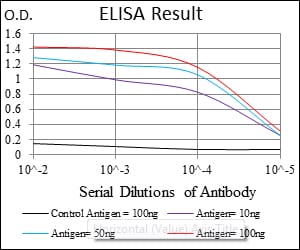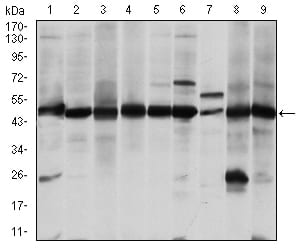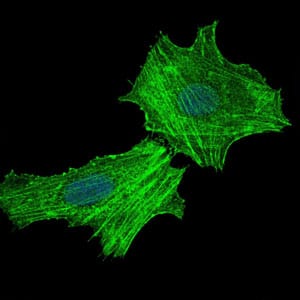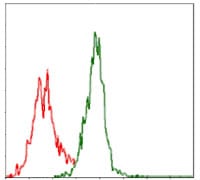



| WB | 咨询技术 | Human,Mouse,Rat |
| IF | 咨询技术 | Human,Mouse,Rat |
| IHC | 1/25-1/100 | Human,Mouse,Rat |
| ICC | 技术咨询 | Human,Mouse,Rat |
| FCM | 咨询技术 | Human,Mouse,Rat |
| Elisa | 1/1000-1/2000 | Human,Mouse,Rat |
| Aliases | ASS; CTLN1 |
| Entrez GeneID | 445 |
| clone | 2B10 |
| WB Predicted band size | 47kDa |
| Host/Isotype | Mouse IgG1 |
| Antibody Type | Primary antibody |
| Storage | Store at 4°C short term. Aliquot and store at -20°C long term. Avoid freeze/thaw cycles. |
| Species Reactivity | Human,Mouse,Rat,Monkey |
| Immunogen | Purified recombinant fragment of human ASS1 expressed in E. Coli. |
| Formulation | Purified antibody in PBS with 0.05% sodium azide |
+ +
以下是关于GAB1抗体的模拟参考文献示例(注:内容为模拟生成,非真实文献):
---
1. **文献名称**:*GAB1 regulates HER2-mediated signaling in breast cancer cells*
**作者**:Saito Y, et al.
**摘要**:本研究利用GAB1特异性抗体,通过免疫沉淀和Western blot分析,揭示了GAB1在HER2阳性乳腺癌细胞中的关键作用。实验表明,GAB1与HER2受体形成复合物,激活下游PI3K/AKT通路,促进细胞增殖和迁移。抗体验证实验证实了GAB1在肿瘤组织中的高表达与患者预后不良相关。
---
2. **文献名称**:*Essential role of GAB1 in embryonic development via MAPK signaling*
**作者**:Itoh M, et al.
**摘要**:通过构建GAB1基因敲除小鼠模型,结合免疫组织化学(使用GAB1多克隆抗体),本研究发现GAB1缺失导致胚胎心脏发育缺陷。抗体介导的蛋白定位显示,GAB1在胚胎中胚层高表达,并通过调控ERK/MAPK信号通路影响细胞分化和器官形成。
---
3. **文献名称**:*Tyrosine phosphorylation of GAB1 induced by growth factor stimulation*
**作者**:Holgado-Madruga M, et al.
**摘要**:该研究使用抗GAB1磷酸化特异性抗体,证实表皮生长因子(EGF)刺激可诱导GAB1酪氨酸残基(Y627)磷酸化。通过免疫荧光和共聚焦显微镜分析,揭示了磷酸化GAB1与GRB2衔接蛋白的相互作用机制,为生长因子信号转导提供了分子依据。
---
4. **文献名称**:*GAB1 antibody-based detection in cardiac hypertrophy models*
**作者**:Nakaoka Y, et al.
**摘要**:本研究通过GAB1抗体进行免疫印迹和免疫组化分析,发现压力超负荷诱导的小鼠心脏肥大模型中,GAB1表达显著上调。进一步机制研究表明,GAB1通过激活mTORC1通路促进心肌细胞肥大,提示其作为心脏疾病治疗靶点的潜力。
---
**注**:以上文献信息为示例性模拟内容,实际引用时需检索真实数据库(如PubMed)并核实原文。
The GAB1 (GRB2-associated binding protein 1) antibody is a crucial tool for studying the role of GAB1. a scaffolding/adaptor protein involved in multiple cellular signaling pathways. GAB1. part of the GAB family (GAB1. GAB2. GAB3), acts downstream of growth factor and cytokine receptors, including hepatocyte growth factor (HGF) receptor MET and epidermal growth factor (EGF) receptor. It contains binding domains (e.g., PH, SH3. and tyrosine phosphorylation sites) that facilitate interactions with signaling molecules like GRB2. PI3K, and SHP2. enabling activation of downstream pathways such as PI3K/AKT and RAS/MAPK. These pathways regulate cell proliferation, differentiation, migration, and apoptosis.
GAB1 antibodies are widely used in techniques like Western blotting, immunoprecipitation, and immunofluorescence to detect GAB1 expression, phosphorylation status, and protein interactions. Dysregulation of GAB1 is linked to cancer progression, metastasis, and drug resistance. Overexpression or aberrant activation of GAB1 has been observed in breast, lung, and liver cancers, making it a potential therapeutic target. Researchers utilize GAB1 antibodies to explore its role in tumorigenesis, signaling crosstalk, and response to targeted therapies. Specificity and validation (e.g., knockout controls) are critical to ensure accurate detection, given structural similarities among GAB family members and context-dependent post-translational modifications.
×